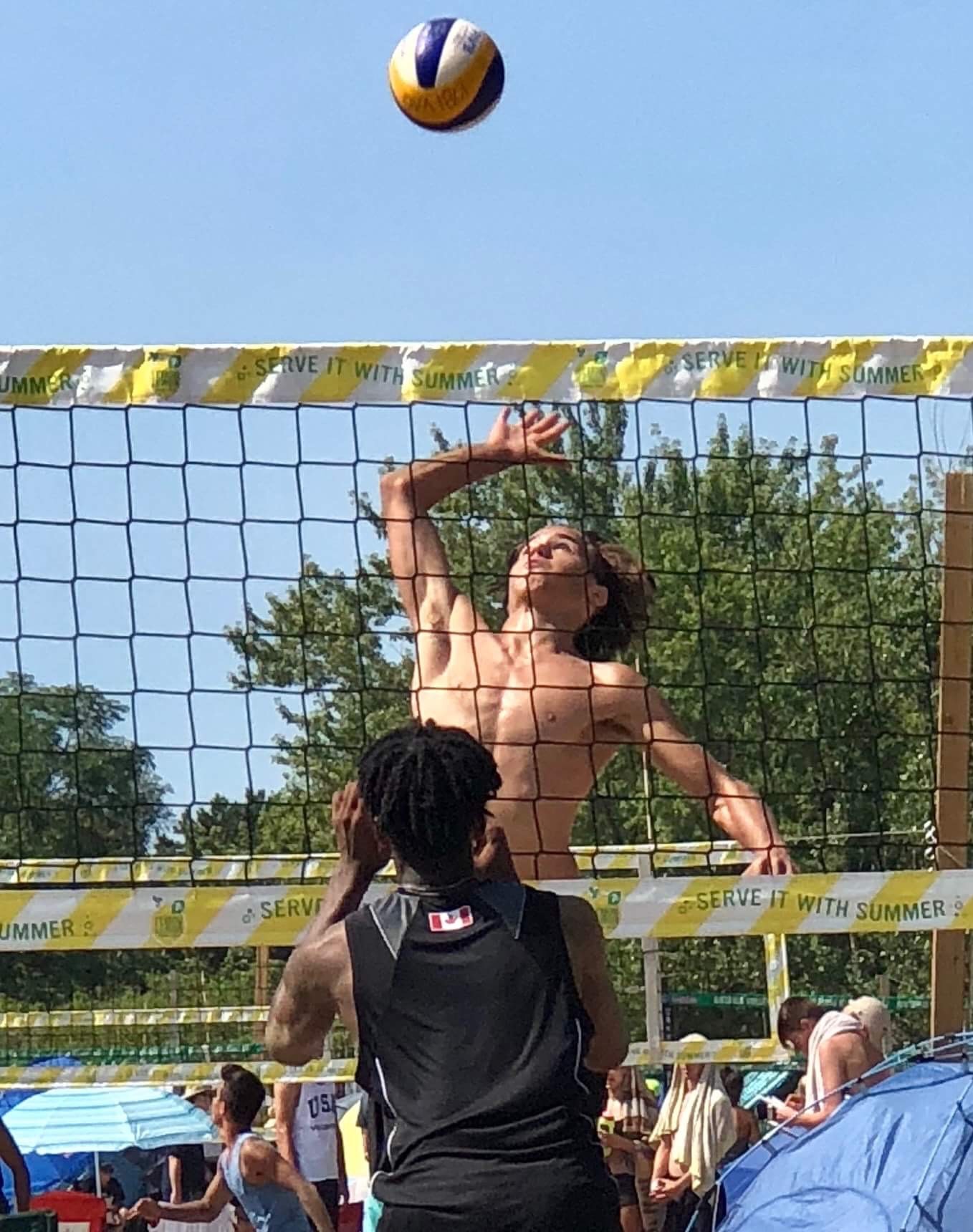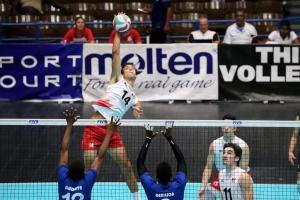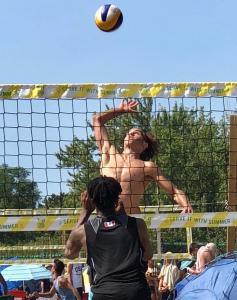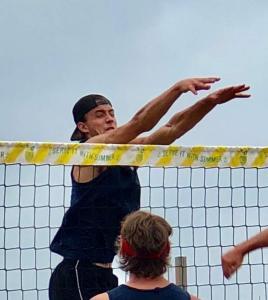Ketrzynskis Making a Name for Themselves in Volleyball Circles

By DAVID WINER
Mention Ketrzynski and astute followers of the sport will tell you the family name represents the past and, undoubtedly, a bright future in Canadian volleyball.
Alexander Ketrzynski provided great pride and joy for fans in the early 1980s when he helped Canada earn its best finish in Summer Olympics history, and now there is great optimism one, if not all, of his three sons will follow in his footsteps and represent this country on the world stage in the not too distant future.
The great run of international successes for Alexander Ketrzynski began at the 1983 World University Games in Edmonton. A highlight at those Games that attracted 2,400 athletes from 73 countries and was graced by Prince Charles and Princess Diana, was this country’s volleyball team.
After defeating China, Japan and Italy in the preliminary round, Canada defeated Korea in the semi-finals 3-0, before losing to Cuba 3-1 in the gold medal match before 13,000 boisterous fans at the Edmonton Coliseum. It was the largest crowd to ever attend a volleyball match in Canada.
“Competing at FISU provided us with our first major exposure within our own country,” recalled Ketrzynski of the silver medal showing. “We were already accustomed to competing in front of large audiences in other parts of the world, but FISU showed us that Canadians actually cared about our efforts and it gave us a special impetus in qualifying for and competing in the ’84 Olympics.”
With Ketrzynski on the roster, Canada managed its best finish at an Olympic Games in Los Angeles. While most Eastern Bloc countries boycotted the Games, Canada still impressed, qualifying for the medal round with wins over Egypt, China and Japan after an opening 3-1 loss to Italy. After losing to the hosts from the United States in the semi-finals, Canada dropped the bronze medal match to Italy, to place fourth.
Thirty-four years later Canada is still trying to eclipse that showing after placing ninth in 1976, 10th in 1992 and fifth in 2016 in Rio de Janeiro.
Teammates from that 1984 team included Volleyball Canada Hall of Fame inductees Paul Gratton, Tom Jones, Don Saxton, Terry Danyluk, Allan Coulter and Glenn Hoag, who was enshrined as a coach.
 Ketrzynski’s passion for volleyball now flows through the veins of his sons, Trent, Xander and Cole, who decided to make Mississauga Pakmen their home club, despite having to regularly make the lengthy drive from east Toronto.
Ketrzynski’s passion for volleyball now flows through the veins of his sons, Trent, Xander and Cole, who decided to make Mississauga Pakmen their home club, despite having to regularly make the lengthy drive from east Toronto.
“At the outset I have to confess that, although I chose Pakmen, the final decision to tryout for the club was the boys’,” said Alexander.
“I felt that I would receive better training (at Pakmen),” said Trent, who adds his choice to head west to Mississauga has paid dividends over the past three years.
Check PAKMEN’s High Performance Volleyball programs |
Check PAKMEN’s Leagues |
“I’ve grown mentally because I had to compete every practice for a starting spot, which I didn’t have to do at my last club.”
“For me, going to Pakmen was a chance to find a challenging environment to train in,” explained Xander. “An environment where you’re always pushed to be your best every day. Having played three years of 18U has forced me and my game to mature at a greater rate due to playing with, and against, an older group of guys.”
“I think we all made our own decision to go,” recalled Cole, “For me, it had a lot to do with the great training environment (Pakmen) had as well as the very good technical coaching.”
And, the results have been scintillating.
Xander, who turned 18 in January, is the oldest of the three brothers, and is in his first year at Ryerson University. Before graduating from Pakmen, Xander represented the 18U Pakmen as well as Team Ontario for all three years since changing clubs.
An opposite on Canada’s 21U Junior National Team, Xander wrapped up his Pakmen career by winning the Provincial and National 18U Indoor Championships in 2018, while being named the MVP; winning the Canada Summer Games and being named MVP in 2017; grabbing gold at the US High Performance Championship International division while earning MVP honors in 2017; taking the Ontario 16U beach championship in 2015, while playing a year up; and Ontario Summer Games gold.
Trent and Cole, 17-year-old twins, who will compete for Pakmen 18U this upcoming indoor season, while completing their studies at York Mills Collegiate, have also enjoyed their share of successes.
Trent is a three-time Provincial and National club champion, including one National all star selection; is a Team Ontario National champion, who has also won a National beach title.
Cole, meanwhile, is a 2018 Provincial and National Indoor champion and all star, a Canada Summer Games Indoor gold medalist; the US High Performance Championship winner in 2017 with Ontario; an All Star at the US High Performance Championship in 2018 with the Canadian Youth National Team; Provincial and National Beach champion in 2017; a three-time Team Ontario member; a National all star in 2017; and entering his third year of 18U play for Pakmen.
Each medal and accolade has been a confirmation that Alexander made the right choice in suggesting his boys head west to Pakmen.
“I chose Pakmen based on the way that the teams coached by (club founder) Kelly Smith and Jessy Satti competed,” explained Alexander, who did his fare share of research. “At very young ages, their teams performed as units in support of each other, no matter the disparity in skill. I saw players so eager to defend they would literally dive over another player on the ground to get to a ball. I saw players who were far more vocal, energetic and celebratory than any other club. I saw players who were far more disciplined than on any other teams. The coaches did not bend over backwards to be diplomatic with the players, or be silent when they failed to give full effort. The teams were incredibly engaged and genuinely enjoyed themselves.”
Alexander cites one instance when he knew choosing Pakmen was the right decision for his boys.
“When I first encountered Pakmen it was at an age group where the ‘fair play’ rule was enforced,” he recalled. “The starting six would play the first of three games followed by the second six of usually less developed players then followed by a mix of both lines or the first line. In one instance, Kelly’s starting six easily won their first game, but displayed an unenthusiastic and cavalier attitude. Kelly then played the second six and left them in for the third game to the obvious disappointment of the first six. This showed me that Pakmen athletes were expected to continuously earn the privilege to play in games no matter how proficient they happened to be. Pakmen coaches showed they had a superior understanding of young people and were not afraid of forcing each player to continually push their own boundaries in order to improve.”
 Ketrzynski also quickly noticed and appreciated other facets of the Pakmen experience other clubs didn’t provide.
Ketrzynski also quickly noticed and appreciated other facets of the Pakmen experience other clubs didn’t provide.
“The Pakmen rep program has always been run as a strict, non-profit organization, meant to be more affordable than most other clubs,” noted the father. “This meant that participants were drawn from a much wider socio-economic range and valued their participation as a privilege. I was very excited when I heard about this aspect. I knew Pakmen would provide a much more valuable cultural as well as competitive experience.
“My boys also happened to be at varying levels of development, all above their slotted age group. And Pakmen promised that Xander, Trent and Cole would be allowed to compete on whatever age team their skills would allow them to. This was very important so that the boys would be challenged appropriately.
Check PAKMEN’s High Performance Volleyball programs |
Check PAKMEN’s Leagues |
“I thought the boys would at most try out for a team one year older,” recalls Alexander with a smile. “Instead, Cole and Xander both made teams that were composed of players two years older. Both had to struggle to gain a starting positions, but they persevered, and eventually grew into leadership roles. Trent, who was always the shortest of the three, played at his age group, but was always made to compete for his spot and challenged athletically and psychologically at every moment.”
As members of the Pakmen, the three boys were given access to Matthew Harris, who along with coaching for the Pakmen, headed up a number of Provincial and National teams as well as assisting at Ryerson, before taking over the reins of the men’s program this year.
“One of the most influential coaches they’ve been lucky enough to work with is Matthew Andrews-Harris,” said Ketrzynski. “(Matthew) has coached all three boys at Pakmen and at the Provincial and National Youth Team levels. His stated goal with all three boys has been to turn them into players who are so dependable that they are the players who automatically are given the ball when an important game is on the line.
 “In my opinion it is a relatively easy thing to become an excellent player in the first 20 points of a game compared to an error-free and winning player in the final five points of a game. It has taken an incredible amount of effort for all three to become extremely dependable in the final points of any close match. Coach Harris has unfailingly put all three boys in this position at every opportunity. He’s done this probably because he’s recognized the ability to handle pressure in all three of them, but they’ve all experienced anguish when they started on their journey with coach Harris. It eventually resulted in Xander and Cole on Matt’s Ontario Team being the first Canadian team to ever win the international division of the US High Performance Championship last summer and also winning the Canada Summer Games, both in five sets.”
“In my opinion it is a relatively easy thing to become an excellent player in the first 20 points of a game compared to an error-free and winning player in the final five points of a game. It has taken an incredible amount of effort for all three to become extremely dependable in the final points of any close match. Coach Harris has unfailingly put all three boys in this position at every opportunity. He’s done this probably because he’s recognized the ability to handle pressure in all three of them, but they’ve all experienced anguish when they started on their journey with coach Harris. It eventually resulted in Xander and Cole on Matt’s Ontario Team being the first Canadian team to ever win the international division of the US High Performance Championship last summer and also winning the Canada Summer Games, both in five sets.”
Harris thought enough of the Ketrzynskis that he made the 6-foot-9 Xander his first recruit to play for the Rams in 2018.
Check PAKMEN’s High Performance Volleyball programs |
Check PAKMEN’s Leagues |
“I chose to play for Matt because he is one of the smartest coaches I’ve ever played for,” said Xander, who is studying Arts and Contemporary Studies. “Yet, at the same time, he is a coach who will continue to learn and improve his methods to help his players be the best they can be.”
“Xander’s versatility and willingness to do what’s best for the team has been displayed by him excelling on the national and international stage in multiple positions,” said Harris of his recruit. “Winning at the Canada Games playing middle, winning 18U club nationals playing left side, and finally representing Canada on the junior team as an opposite are a clear indication that he will put the team first and that all his hard work at playing beach is paying off indoors.
“All three kids care deeply about their teammates,” said Harris of the family. “And they are the No. 1 fans of all the players on their team.
“They also work extremely hard off the court at physical training. Each, in their own way, spends a tremendous number of hours in the gym so that they can play at a high level and maintain their physical abilities. All three boys can also maintain their composure under the most challenging conditions. And it’s their experience that they can draw upon in those crucial moments.
“Trent’s desire to always improve is evident every time he steps on to the court,” continued Harris. “He works extremely hard at becoming the best setter he can be. He can also play multiple positions, which leads to him being a tremendous beach player. Trent’s devotion to working on his craft can be seen when he gets to practice early and is always looking for those extra reps. Trent has been a key contributor and leader on his teams’ successes in the past.
“Cole’s willingness throughout his club years to improve and develop while playing above his age (group) has been a real display of sheer determination,” added Harris. “His steady improvement has skyrocketed in the past two seasons. His ability to read the play and make snap decisions, is exceptional, and continues to improve. Cole has been a vital contributor playing in the past three club National finals. In 17U and two years in a row at 18U. He was also a major impact player on and off the court for the Canada Games gold medal team.
“The family as a whole are great people,” summed up Harris. “They all care for everyone they play and coach with immensely. All three boys are very respectful to teammates, coaches, and opponents. And they are always the best examples of how the coach wants the players to play.”
 Harris states that their father has much to do with the maturity, poise and respect all three boys display on a daily basis.
Harris states that their father has much to do with the maturity, poise and respect all three boys display on a daily basis.
“Coaching with Alex has been an exceptional experience,” said Harris. “His devotion to making all those around him better at volleyball is best displayed by his sheer will to coach every play and point like its a championship point. And, he is selfless in doing any role necessary. He will take on any task given to him. Here is a former Olympian setting up ball carts and fiddling around with high school gym nets because he knows that’s what it will take for the players to have a good practice. His desire to improve as a coach is evident all the time as he is constantly asking questions and also trying to make me a better coach by asking challenging questions as well.”
For their parts, Trent, Alex and Xander have a respect and appreciation deserving of a former Olympian who just happens to be their dad.
Check PAKMEN’s High Performance Volleyball programs |
Check PAKMEN’s Leagues |
“I don’t remember exactly how old I was when I first heard the stories he told me,” recalls Trent. “But I was always really excited to hear, as a kid, of his (volleyball) career and always thought that it was so cool that he played in the Olympics.”
“Ever since I can remember he’s always told me stories about his time there (in LA in 1984)and he has used it as an example of how my brothers and I should continue to train,” added Xander.
“I don’t know if there was a specific day that I found out he played in the Olympics,” recalls Cole. “It was sort of one of those things I grew up knowing. I’ve heard countless stories from when he was on the team and when he was younger in general.”
Despite his love for the sport of his life, Alexander always realized his sons would have to decide for themselves what sports they chose to pursue.
An accomplished swimmer himself before turning all of his attention to volleyball, Alexander appreciates how athletes have to decide on their own what paths to take.
“Competitive swimming was my best preparation for succeeding at volleyball,” said Alexander, who would endure 12 practices a week before and after school. “I was able to engage my competitive nature by trying to be first on every repetition, in every practice and in every competition for six or seven years until the age of 15. I also participated on many school teams, and I eventually reached third in the country in breaststroke before I burnt out.”
While pursuing his swimming career, Alexander realized something that truly mattered to him that affected the way he supported his sons.
“It was very important to me that my father attend all of my evening and weekend practices as well as competitions.”
When the elder Ketrzynski grew weary of swimming, his biology teacher George Pentland reintroduced him to a sport he played outdoors with family and friends at the age of 6.
“George convinced me to join my high school team because of my height,” recalled Ketrzynski. “He was a former army officer and provided the very disciplined and hard working environment I’d learned to love in swimming.”
Admittedly “clumsy” initially Ketrzynski took advantage of practices Mr. Pentland would hold out of season. Before long, “I was able to catch up, and, pass the rest of the team. I also joined Valerie Long at Toronto West volleyball, a club that was also very strong in discipline and hard work.”
Ketrzynski continued to make advances by playing as a junior with senior players, who formerly played university and junior national level ball.
After that, he joined the provincial and junior national teams.
“Our Junior National Team won the NORCECA zone championship and became the first Canadian volleyball team to win international gold,” Ketrzynski adds with great satisfaction.
As a dad, the former Olympian has been mindful in raising his three sons, forever walking the tightrope of helping his sons without being too hands on, impatient, or demanding.
“The boys competed in many sports before they settled on volleyball and I only played volleyball with them for fun on the beach at Ashbridges Bay,” explained Ketrzynski about growing up with his sons. “If they got bored and just wanted to play in the sand, I was happy just to be a part of it. It was a very happy and relaxed time. When they got tired of the sand we would go to the pool and splash about. When they started to get the hang of the game, I tried to keep it interesting by teaching them special nuances that they were not likely to learn from coaches, such as how to easily take a ball out of the net and turn it into a set. It always ended in a game between the four of us. These nuances also helped them play at a higher level than their peers and gave them a feeling of pride.
“In our formal coaching experiences at school and club I only participated in support of head coaches,” continued Ketrzynski. “To the present day I only help my boys by attempting to improve their entire team. In their first club, we regularly snuck into the gym often over an hour early and I tried again to teach them skills they would not learn in the context of their teams or to improve them in ways that would allow them to become well rounded players as opposed to merely concentrating on what they already were good at. Often we would practice at levels that were much more intense than they would get from a club team.
 “I often asked what they felt they needed to work on and we would follow through on what they wanted. The activities were meant for them to, not only succeed, but to gently push their boundaries. Most importantly, they learned to take pride in pushing their own boundaries independently of whatever situation they found themselves in. I believe they felt a lot of pride and a confidence that they could achieve anything they wanted to. We always ended with fun free-play as decided by them, which usually ended up as one against one on a small court. I believe this gave them a feeling of confidence when they practiced and played with their peers and enabled them to often play beyond their own age level. I also wanted them to have a feeling that they were in control of their own development independent of me or anyone else.
“I often asked what they felt they needed to work on and we would follow through on what they wanted. The activities were meant for them to, not only succeed, but to gently push their boundaries. Most importantly, they learned to take pride in pushing their own boundaries independently of whatever situation they found themselves in. I believe they felt a lot of pride and a confidence that they could achieve anything they wanted to. We always ended with fun free-play as decided by them, which usually ended up as one against one on a small court. I believe this gave them a feeling of confidence when they practiced and played with their peers and enabled them to often play beyond their own age level. I also wanted them to have a feeling that they were in control of their own development independent of me or anyone else.
“I think patience played a big role in their development. Whenever they became frustrated I tried to tell them just to try their best and they would eventually acquire difficult skills if they were patient with themselves and not to feel badly about not learning everything instantly. I believe they don’t panic when they make mistakes because they know they’ll be able to adapt.
Check PAKMEN’s High Performance Volleyball programs |
Check PAKMEN’s Leagues |
“My experiences as an athlete allowed me to see that competing and coaching are very distinct skills and that at least, in my case, my boys would be better served by individuals who were more skilled at coaching than I was. I’ve never forgotten my learning experiences and I can best serve my boys and their teammates by offering them the insights of an athlete that has gone through all of the challenges they face as club athletes. I treat head coaches deferentially, support them in any way I can and praise them when they’ve done a good job. Coaches appreciate positive feedback just as players do.”
All three boys distinctively remember and cherish the days at Ashbridges as well as those private sessions they would have with their dad before practices.
“I became interested in volleyball at an early age when my dad would take us down to the beach in the summer to play and watch beach volleyball,” recalled Trent, who says his No. 1 sport growing up was hockey until Grade 8.
“Dad taught me from a young age to keep my hands high when setting and to have an aggressive mentality when playing defence,” continued Trent. “Keeping my hands high really helped me at a young age because it helped me stand out from the other setters who didn’t learn that skill.”
“I always played some volleyball growing up usually on the beach, or school team, but I’d say my strong interest arose during my first year of club in Grade 6, which also became my last year of competitive hockey.
“It was more the little things, such as how to roll a certain way to dig a ball, and competitive attitude,” recalled Trent of the days on the beach.
“As soon as I started to play volleyball I really started to enjoy it, but I think my interests really came from messing around with a beach ball while I was a kid,” is how Xander remembers it. “I used to be competitive in hockey and basketball, but nothing compared to volleyball.
“He taught us a bunch of advanced things, such as pancakes and a wide variety of shots that, at that age, were not common. Learning these skills, at an earlier age, gave us a head start on the others.”
The extra coaching before club practices are also fondly remembered by Trent, Cole and Xander.
“Yeah I do remember (those family get togethers in the gym before club practices) and it gave me a lot more confidence because it allowed me to work on the weak points in my game,” said Trent.
“I do remember those very much as well,” added Cole, “as sometimes it’d be two hours before almost every practice for three years.”
“We didn’t exactly sneak in,” amended Xander explaining those days in the gym. “We just went about one to two hours early, and if no one was in the gym, we would just work on fundamental skills ’til our actual practice started.”
And, very much like their diversified recollections to the early days that very much shaped and molded their young playing careers, Cole, Trent and Xander are very much their own people with their own identities.
“All three of the boys are dramatically different, but they also have many character traits and attitudes in common,” said Alexander.
“Perhaps their most important similarity is their manner and ability to relate to other people whether they are teammates, coaches or much younger kids they may be helping at the club. I never get tired of hearing about what good people they are from other parents, coaches, teachers and from what I observe in their interactions with teammates and friends. They’ve been taught to be empathetic to the differences of other people before jumping to quick conclusions. In volleyball it has borne itself out in the boys getting along very well with their teammates and being universally regarded as extremely coachable. They have also been among the most highly sought after athletes for varsity volleyball programs in North America.
“The boys and I have had discussions over the years about how to deal with our emotions and volleyball has provided a great context in which to frame these discussions.”
Born in 2001, twins Trent a 6-foot-5 setter, and Cole a 6-foot-7 power hitter, have many similarities in the eyes of their father, as well as discernible differences.
“Cole and Trent are both very methodical and even-keeled in their approaches to life and the game in my opinion. Both are fairly soft-spoken and private individuals, but they are strong leaders in competition. Both take in a tremendous amount of information in short order. Both can absorb game strategies on the first try that leave me baffled for a week or two. I’ve been told that Cole is able to change game strategy completely during the heat of a match with just a couple of words from the coach. I’ve watched Trent execute game strategy as a setter and also switch on the fly as required or requested at any point in the game or match. He’s also totally unfazed by the difficulty of the set he needs to deliver at the most crucial parts of a match. Both are unfailingly diplomatic, but business-like during matches. They’re also business-like during practices, but more friendly than in matches.
“Many feel that Trent is the most underestimated player of the three. Trent is the most studious player. He is constantly pouring over video of international matches and his own. His physical growth has come later than his brothers, but he is also playing the most difficult and underrated position of setter. As I’ve mentioned, he processes a tremendous amount of information and makes decisions that belie his youth.
“I’ve already spoken about Cole’s cerebral approach to the game, but he also has a rare ability to see the game at multiple levels. All hitters can see the ball and hit hard. Slightly more advanced hitters see the block and make decisions on how to attack. Only the most advanced players, I’ve ever encountered, are able to look beyond the block and see the defenders and decide where to place the ball once they have dealt with the block. Though he’s still developing his ability, Cole has confessed to me he is able to see what the defenders are doing behind the block.”
Cole and Trent certainly concur that volleyball has made them better people and has also contributed to their level of maturity.
“I think I’ve grown a lot over the years,” says Cole. “I have a much more complete game and my knowledge of the game has grown greatly as well.
“I feel like volleyball has always been a place for me to sort of be myself and forget about everything that is bothering me in the outside world and, because of that, it definitely has helped me emotionally.”
“It’s taught me how much you have to work to get good at something and the consistency you need in your work ethic to stay good at it,” said Trent. “High pressure situations have really taught me how to deal with nervousness.
“(Volleyball) has definitely taught me how to work with others and develop leadership qualities, because in order to be successful, the team needs to have good chemistry.”
At 6-foot-9, Xander is the oldest of the three sons having been born a year earlier, and a bit different as well.
“He’s more openly emotional off and on the court than his brothers, without being volatile,” said Alexander of his oldest son. “He doesn’t mind harnessing aggression and sometimes anger to get the job done on the court. Although he is intelligent in his approach to the game, he’s much more likely to use shear force to hit over the block and through the defense.
“He’s also obsessive about his training, both on and off of the court. He’s the type of competitor who only seems to have one speed; full out. In a practice, he will throw the ball a couple of times and then he will immediately go to almost 100 per cent. In practices, matches and the weight room he appears to be hyper focused on what he’s trying to achieve and on the instructions of his coaches and trainers. Xander is a leader by working at full intensity, whether or not his teammates feel the same way, and it is my sense that his behavior encourages his teammates to pick up their level of intensity when necessary,” summed up Alexander of Xander.
For his part, Xander feels volleyball has helped him in a number of ways.
“Playing volleyball has made me a more social individual because of the the amount of communication that is required at the top level,” said the newest Ryerson Ram. “It has also taught me how to manage my emotions on and off the court.”
One thing is certain. Alexander is proud of his three sons and happy with the way they’ve turned out.
“All the boys are independent and self directed in their sports careers,” said Alexander. “They listen to the advice they receive from the people they trust then make their own decisions.
“Off of the court, all the boys are quietly confident and enjoy close, mutually supportive and relaxed relationships rather than hanging with a big crowd.”
And, while Xander, Cole and Trent are aware of each others’ differences, you won’t find a closer family.
“The differences that I would note are that compared to Cole I tend to take more risks, while I’m a louder and more aggressive player than Trent,” says Xander.
“I’d say I’m a little more level headed than my dad, or Xander when it comes to sports,” giggled Cole, “but don’t tell them that.”
Asked what they most respect about each other, is when you realize the true respect they share for one another.
“I respect that every time they get in the gym, or the weight room, they push themselves to the fullest of their abilities,” said Xander.
“I respect how humble they are after all their accomplishments,” adds Trent.
“Probably their kindness and their love for the game,” commented Cole.
Each is also thrilled they had the opportunity to play as teammates for two years at York Mills, placing third and fourth at OFSAA.
“We have never gone to the finals at OFSAA, but the best part about playing with them is that you always know they’re gonna show up to play and have your back,” said Xander.
Somehow one knows that will always be the case, as thanks to their father’s input, they are each others’ biggest cheerleaders.
Check PAKMEN’s High Performance Volleyball programs |
Check PAKMEN’s Leagues |
